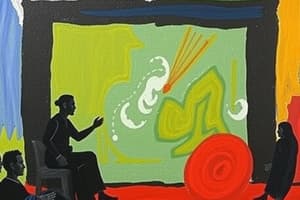Podcast
Questions and Answers
What happens to the life-god in the story?
What happens to the life-god in the story?
- It is reborn as the winter-god.
- It gets killed by the winter-god and stays dead.
- It kills the winter-god and dances over its corpse.
- It rises again after being killed and kills the winter-god in revenge. (correct)
What is the main purpose of the Greek tragic dramas?
What is the main purpose of the Greek tragic dramas?
- To instruct people about moral relationships between gods and men. (correct)
- To entertain people with stories of mythological gods.
- To glorify the power of Greek gods.
- To showcase the acting skills of Greek actors.
What is a common characteristic of a tragic hero in Greek tragedy?
What is a common characteristic of a tragic hero in Greek tragedy?
- He has the power of choice and free will.
- He has a flaw in his character that leads to his downfall. (correct)
- He is destined for greatness from birth.
- He is always a king or a noble.
What is the difference between a Greek tragic hero and a Shakespearean hero?
What is the difference between a Greek tragic hero and a Shakespearean hero?
What is a common theme in Shakespearean tragedy?
What is a common theme in Shakespearean tragedy?
Which play is often cited as a representative example of a tragic hero?
Which play is often cited as a representative example of a tragic hero?
Who wrote the famous play 'Doctor Faustus'?
Who wrote the famous play 'Doctor Faustus'?
In which era did drama flourish in England?
In which era did drama flourish in England?
What is the basis of drama according to the text?
What is the basis of drama according to the text?
What is a fundamental aspect of human learning?
What is a fundamental aspect of human learning?
What is sympathetic magic based on?
What is sympathetic magic based on?
What was the purpose of the early drama?
What was the purpose of the early drama?
What did primitive societies believe in terms of?
What did primitive societies believe in terms of?
What was the role of the community member in a magical ceremony?
What was the role of the community member in a magical ceremony?
What is the result of sympathetic magic on the wax image?
What is the result of sympathetic magic on the wax image?
Why did primitive societies practice sympathetic magic?
Why did primitive societies practice sympathetic magic?
Flashcards are hidden until you start studying
Study Notes
Drama and the Imitative Faculty
- Drama is based on the fundamental human faculty of imitation, which is essential for human children to learn and perform various functions.
- The imitative faculty makes humans natural actors, and children often play roles like doctors, kings, and queens.
- The first drama was not play, but a serious activity performed by grown men, expressing the religious instinct.
Sympathetic Magic and Fertility Myths
- Sympathetic magic is a type of magic that believes whatever happens to an image must also happen to the person.
- Primitive societies believed that the god of life died in winter and could be brought back to life through sympathetic magic.
- In magical ceremonies, members of the community would pretend to be the life-god and death-god, and the life-god would miraculously rise again after being killed.
- This type of magic is based on the belief that what happens in representation must happen in fact, ensuring the earth's fertility and growth.
Greek Drama
- Greek drama had reached a more sophisticated stage, dealing with the moral relation between gods and men, with an instructive moral purpose.
- Greek tragic dramatists wrote religious dramas, usually taking stories from well-known myths.
- A tragedy deals with the fall of a man from power, brought about by a flaw in his character or a specific sin.
- King Oedipus is an example of a tragic hero, whose fall was brought about by sins he committed unknowingly.
Elizabethan Drama (Marlowe and Shakespeare)
- The Elizabethan age was the age of drama.
- Christopher Marlowe's Doctor Faustus, written in 1588, is the most famous drama from the Elizabethan era not written by William Shakespeare.
- Greek tragedy differs from Shakespearean tragedy in that the Greek heroes have no free will, while Shakespearean heroes have the power of choice and free will.
Studying That Suits You
Use AI to generate personalized quizzes and flashcards to suit your learning preferences.




